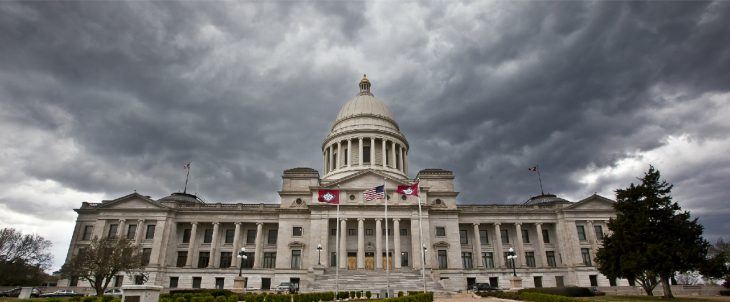Sen. Rapert, chair of State Agencies, says special session may be needed for redistricting
by February 21, 2021 8:56 am 1,911 views

Sen. Jason Rapert, R-Conway, chair of the Senate State Agencies and Governmental Affairs Committee, said in a Talk Business & Politics interview released Sunday (Feb. 21) that lawmakers may need a special session to deal with Congressional redistricting.
Rapert also outlined how he expects the referral process for potential constitutional amendments to work this legislative session.
The legislature’s state agencies committees redraw Congressional district lines every ten years after the Census is taken to account for population shifts and numerically-balanced representation. The Board of Apportionment – which consists of the Governor, Attorney General and Secretary of State – redraws the 100 House districts and 35 Senate districts every decade. Republicans will control both of those redistricting tasks for the first time in the modern political era.
Putting the blame squarely on the U.S. Census Bureau and the Biden administration, Rapert said he’s not convinced the delay in population data is due to the pandemic, which hamstrung the ability to collect Census info. He said the efforts to identify illegal immigrants, who are attempted to be counted in the Census, is the reason he’s hearing that data may not be available until September. It is typically provided in January of the year following the Census but was already pushed back to April before a newly announced delay until September.
“I’m very disappointed in the United States Census Bureau and the Biden administration. We were pending the release of that information in January. If you go look closely at the reports in the news in this arena, the brakes suddenly got put on as it related to expanding to include the count for illegal immigrants,” he said.
“The announcement that it would be somewhat late in maybe April was one thing. It’s almost unacceptable for them to announce they’re going to be at the end of September. It probably is unacceptable because this is now putting states around the country in great danger of not being able to finish their redistricting in time for the elections [of 2022],” Rapert added.
The Census has been a political football for more than two years as the Trump administration in 2018 changed previous precedent to include block-level citizenship data on questionnaires. Supporters of the move said it would be a true count of legal citizens, while critics complained not counting illegal immigrants would take away representation and government resources for some communities as well as provide a Census undercount. The Constitution calls for an “actual enumeration” of everyone living in the U.S., although it originally excluded slaves and Indians.

Rapert said he has spoken to Arkansas’ Congressional delegation and hopes they will put pressure on or provide more resources to the U.S. Census Bureau to speed up the process. He’s also planning to introduce a non-binding resolution in the 93rd General Assembly calling on an expedition of the process.
“I’ve already told our committee more than once we could be conducting a special session,” Rapert said.
He’s not sure if using 2019 Census estimates would withstand potential legal challenges if lawmakers use that data.
“I want us to do the job right, and I want us to do the job fairly. And what needs to happen is the Census Bureau needs to work around the clock and get the job done. You had one job to do, and you need to do it,” Rapert said.
CONSTITUTIONAL AMENDMENT PROCESS
Another big task for the State Agencies committee during a regular legislative session includes the referral of potential constitutional amendments to voters. Lawmakers filed 43 proposals before a deadline for proposed amendments. Lawmakers can refer up to three proposals for voter consideration in the next general election, which will be in 2022.
Rapert said this session he expects the Senate to refer up to two proposals, while the House will refer one.
“In 2019, the House referred two, and the Senate referred one. In 2017, the House referred one, and the Senate referred one – there were only two. But this is the year for the Senate to have those two amendments that would be put forward, and the House one,” he said, referring to an agreement made several years ago to rotate which chamber had rank. “That has been the tradition, and I have verified that with the Bureau of Legislative Research on the 2019 status. So, it’s the Senate’s turn if you will to be able to put forward two.”
The chairman said he doesn’t expect to begin debating any of those proposals for awhile. Last week’s snowstorms delayed the legislature from convening and there is catch-up work to be done.
“We will set a date in the future. It will not be next week because we’re just getting back after the inclement weather that we’ve all gone through,” he said.
A couple of resolutions that will be considered for amendment referrals are co-sponsored by Sen. Rapert, but he said he is very open to many filed resolutions. He said he’ll be looking for consensus on what is deemed most important by members.
“I am actually on a couple of the amendments that have been filed, and those amendments have my name on them. Obviously, I support them. However, it does not mean that I do not support other amendments. My position is whether a chairman has his name on a particular amendment or not is to give fair play and fair access to anything that’s out there because I absolutely appreciate and support conceptually many of the amendments that have been filed,” Rapert said.
